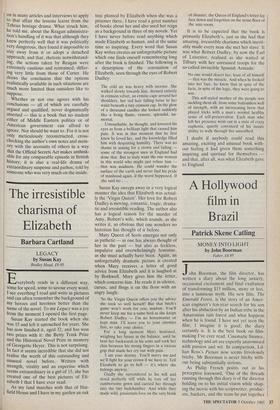The irresistible charisma of Elizabeth
Barbara Cartland
LEGACY by Susan Kay
Bodley Head, £9.95
Everybody reads in a different way, some for speed, some to savour every word. I see everthing I read and write in pictures and can often remember the background of my heroes and heroines better than the name of the novel. To me Legacy was a joy from the moment I opened the first page.
Susan Kay started the book when she was 15 and left it untouched for years. She has now finished it, aged 32, and has won two prizes with it: the Betty Trask Prize and the Historical Novel Prize in memory of Georgette Heyer. This is not surprising. In fact it seems incredible that she did not realise the worth of this outstanding and Unusual novel before. Written with strength, vitality and an expertise which seems extraordinary in a girl of 15, she has created one of the best pictures of Eli- zabeth I that I have ever read.
As my land marches with that of Hat- field House and I have in my garden an oak tree planted by Elizabeth when she was a prisoner there, I have read a great number of books about her and also used her reign as a background in three of my novels. Yet I have never before read anything which made Elizabeth so human, and at the same time so inspiring. Every word that Susan Kay writes creates an unforgettable picture which one finds oneself remembering long after the book is finished. The following is a description of the coronation of Elizabeth, seen through the eyes of Robert Dudley:
The cold air was heavy with incense. She walked slowly towards him, dressed entirely in crimson velvet, an ermine cape around her shoulders, her red hair falling loose to her waist beneath a tiny crimson cap. In the glow of a thousand candles she looked suddenly like a living flame, remote, splendid, im- mortal.
Untouchable, he thought, and lowered his eyes as from a brilliant light that caused him pain. It was in that moment that he first knew he loved her, and the knowledge filled him with despairing humility. There was no shame in aiming for a crown and failing some of the strongest men in England had done that. But to truly want the one woman in this world who might just refuse him that was madness. He could wander the surface of the earth and never find his pride of manhood again, if the worst happened. If she said no . . .
Susan Kay sweeps away in a very logical manner the idea that Elizabeth was actual- ly the 'Virgin Queen'. Her love for Robert Dudley is moving, romantic, tragic, drama- tic and irresistible reading. The author also has a logical reason for the murder of Amy, Robert's wife, which sounds, as she writes it, so obvious that one wonders no historian has thought of it before.
Mary Queen of Scots emerges not only as pathetic — as one has always thought of her in the past — but also as feckless, impulsive and overwhelmingly feminine, as she must actually have been. Again, an unforgettably dramatic picture is created when Mary receives a letter of good advice from Elizabeth and it is laughed at by Bothwell. Mary gives him the letter, which concerns him. He reads it in silence, curses, and flings it on the floor with an angry laugh:
'So the Virgin Queen offers you the advice she took so well herself! But that bitch's game won't work for you, madam. You'll never keep me for a tame bird as she keeps Robert Dudley — I'm no horsemaster or kept man. I'll leave you to your enemies first, so take your choice.'
For a long moment Mary hesitated, weighing her future in the balance, until he bent her backwards in his arms and took her chin between his strong fingers in a vicious grip that made her cry out with pain.
`I am your destiny. You'll marry me and we'll fight for your crown if we have to. Tell Elizabeth to go to hell — it's where she belongs anyway,' Gladly she surrendered to his will and stood perfectly still while he tore off her cumbersome gown and carried her through into the tiny bedchamber. And while they made wild, passionate love on the very brink of disaster, the Queen of England's letter lay face down and forgotten on the stone floor of the ante-room.
It is to be expected that the book is primarily Elizabeth's, just as she had that amazing, irresistible charisma which inevit- ably made every man she met her slave. It was what Robert Dudley, by now the Earl of Leicester, realised as she waited at Tilbury with her untrained troops for the so-called invincible Spanish Armada:
No one would desert her, least of all himself — that was the miracle. And when he looked into her face, he knew that in spite of the facts, in spite of the logic, they were going to win.
This self-styled mother of the people was suckling them all, from some bottomless well of strength, with an intoxicating brew that played tricks with a man's normal healthy sense of self-preservation. Each man who left her presence went out in a state of crazy euphoria, quietly convinced of his innate ability to walk through fire unscathed.
I doubt if anybody could read this amazing, exciting and unusual book with- out feeling it had given them something inspiring and spiritual for themselves and that, after all, was what Elizabeth gave to England.


























































 Previous page
Previous page